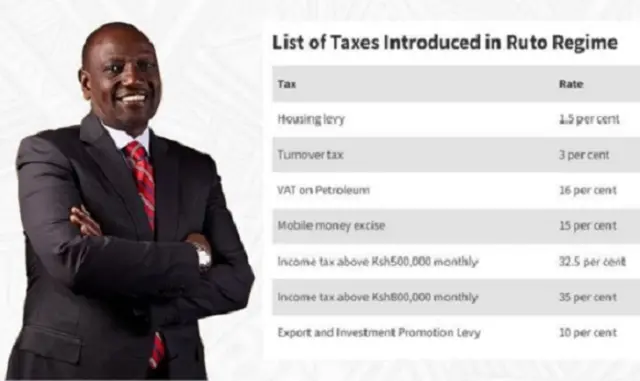
Since taking office in 2022, President William Ruto has implemented a series of tax introductions that have significantly impacted the financial landscape of the country. As the tax burden increases, concerns arise about how these changes will impact citizens and businesses alike.
These new tax policies have significant implications for businesses and individuals alike, as they directly impact the tax burden carried by the nation.
From increased value-added taxes to higher income tax rates, President Ruto’s tax introductions have sparked debate among economists, politicians, and the general public.
Ranging from Housing Levy to taxes that concern a particular niche such as the Export and Investment Promotion Levy, the measures have gone beyond the normal Pay As You Earn (PAYE) and Value Added Tax (VAT).
With a worker’s income reduced, this has forced them to cut back on consumption of items to make ends meet. Others have also lost their jobs as companies seek to cut on costs and stay afloat.
Here below are details of the policies and their consequences.
Finance Act 2023
In July 2023, President Ruto implemented the Finance Act 2023, lining up several tax measures to raise an additional Ksh211 billion.
Housing Levy
Ruto’s government introduced a 1.5 per cent levy paid by employees which is matched by employers.
Background
One of the President’s legacy projects, the Housing Levy came into effect amid legal hurdles, including a High Court ruling in July 2023 that declared the levy illegal due to lack of public participation. After nearly a nine-month battle, the Affordable Housing Bill was drafted and tabled in Parliament.
The proposal was passed in both houses and took effect on March 19, 2024, when the Head of State assented to the bill.
It has however been challenged in court again.
Impact
Following several amendments to the bill, all Kenyans will be required to pay 1.5 per cent of their gross monthly pay.
This also includes Kenyans working in the informal sector and also those not earning salaries.
Doubling of VAT Tax
The Value Added Tax (VAT) rate on petroleum products was doubled to 16 per cent.
Background
The provision was introduced in the Finance Act 2023, as the government sought to raise an additional Ksh50 billion from fuel taxes.
This was criticised by the opposition members who questioned the impact the amendment had on the cost of living.
On the other hand, Kenya Kwanza MPs argued that the amount would be channelled toward rehabilitation of road networks across the country.
Impact
The provision saw a hike in fuel prices at the time, with a litre of Super petrol rising by an additional Ksh10 in a month. Lower-income households were among the most affected by the amendment due to the rise in the inflation rate.
Turnover Tax
Background
A levy was introduced for all businesses at a standard rate of 3 per cent whether a business made a profit or not.
Impact
The levy was initially charged at one per cent and affected only businesses whose turnover amounted to Ksh1 million or more. With the new provision, all businesses would be affected by the provision.
Expanded PAYE
Background
One of the provisions within the Finance Act, PAYE was expanded by introducing two forms in addition to the current rate of 30 per cent.
Impact
Those earning between Ksh500,000 and Ksh800,000 would have to pay 32.5 per cent while those earning above Ksh800,000 would be required to pay 35 per cent.
This impacted high-earning income households which had to part with more.
Export and Investment Promotion Levy
Background
President Ruto proposed an increase in the Export and Investment Promotion Levy on all imported goods to promote local manufacturing.
Impact
According to Ruto, the levy would be set at a ten per cent rate on the customs value of the imported goods. This was expected to raise Ksh10 billion in revenue.
A caveat is that goods sourced from countries within the East African Community would be exempted from the levy.
By BRIAN KIMANI
Source-https://www.kenyans.co.ke/







